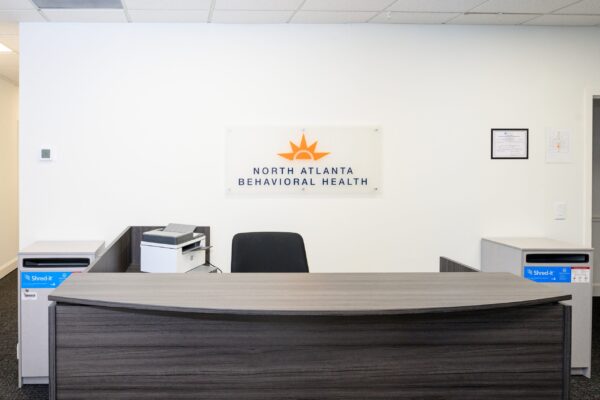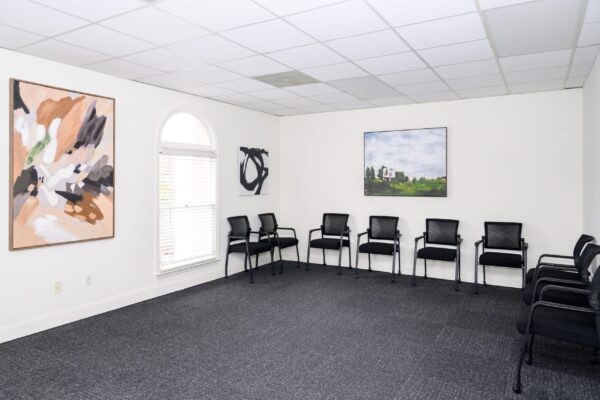When searching for long-term mental health facilities in Georgia, we strive to provide patient-centered, comprehensive treatment for individuals seeking mental health treatment services.. We believe that you shouldn’t have to interrupt your daily life to get help for mental health disorders and you shouldn’t have to face the stigma that having a mental health creates.
Our long-term mental health facilities in Georgia create a personalized approach with individual and group therapies tailored to each person’s unique needs. Our mission is to empower people through competent, compassionate, evidence-based care that addresses an individual’s physical, mental, and emotional issues to live life fully and without limitation.
What is Long-Term Mental Health Treatment?
Long-term mental health treatment is a sustained approach to treating and managing mental health conditions over an extended period. This approach often employs a “full continuum of care,” which is a comprehensive treatment model that provides various levels of care, adapting to the changing needs of the individual over time, helping them to slowly acclimate back to real life successfully. This continuum ensures that individuals receive appropriate, ongoing support, enhancing the sustainability and effectiveness of treatment outcomes.
Our Mental Health Programs in Georgia
How Long-Term Mental Health Treatment in Georgia Works
Detox
Detoxification, commonly referred to as detox, is the process of allowing the body to rid itself of substances while managing the symptoms of withdrawal under medical supervision. It’s a critical initial step in the treatment of substance use disorders, particularly for those with co-occurring mental health conditions. Recognizing its importance, we collaborate with local detox partners to ensure that our mental health clients receive the necessary detox services safely and effectively, laying a solid foundation for their subsequent treatment and recovery journey.
Residential Mental Health Treatment
Residential mental health treatment provides intensive therapy in a structured, live-in environment, focusing on deep therapeutic interventions for individuals with serious mental health challenges. It’s a crucial phase that offers around-the-clock care and support, allowing clients to focus entirely on their recovery without the distractions of everyday life. Understanding its critical role, we collaborate with local residential treatment partners to facilitate access for clients who require this level of care before transitioning to our services, ensuring a seamless and effective treatment journey.
Partial Hospitalization Program (PHP)
A partial hospitalization program, also known as a day treatment program, is the most intensive form of outpatient addiction treatment. Those in a PHP receive treatment during the day but do not have to stay at the facility overnight. Partial Hospitalization Programming (PHP) is typically used as a step down from residential treatment, however, clients can enter this level of care based on clinical appropriateness. Treatment takes place Monday through Friday most of the day with a lunch break in between. Typically during the day, clients are involved in group therapy, experiential therapy, individual therapy, holistic therapy, and more.
Intensive Outpatient Program (IOP)
Intensive Outpatient Programming is a treatment that takes place in a professional facility during the daytime or evening. The number of days and hours per day someone attends IOP depends on the individual’s needs, determined by the treatment provider. IOP provides an effective way to treat conditions like mental health and substance use disorders. It works well for clients who do not need to be in an inpatient or residential program but still need a concentrated amount of time per week to work on their recovery. They can attend their treatment sessions during the day or attend an evening IOP program and still return home at night.
Our intensive outpatient programs typically offer a higher level of care than what other outpatient-type addiction treatment programs offer. For example, most levels of care take place at a hospital or clinic, though some may be offered at private doctor’s offices. Then patients in an intensive outpatient program typically visit the facility for treatment three to four days a week. Each IOP visit typically lasts for about three hours each visit. Your individual recovery plan will vary depending on what best suits your needs.
Outpatient Program
Outpatient mental health treatment is a therapeutic approach where clients receive care through regular sessions without residing at the treatment facility. Typically involving weekly or more frequent visits to a therapist, psychiatrist, or a mental health clinic, this form of treatment is designed for individuals who are stable enough to live at home but still require ongoing professional support. It focuses on managing symptoms, improving coping strategies, and providing tools for long-term mental wellness, making it an essential component for those transitioning from more intensive care or as a standalone treatment for less severe mental health conditions.
How Do I Know I’m a Good Fit for Long-Term Treatment?
Deciding to seek help for mental health disorders can feel overwhelming and oftentimes professional guidance is needed to determine which level of care is most appropriate. Our trained professionals understand that finding the right treatment plan is a unique and individual journey
We recommend contacting us so we can discuss your current situation in more detail to better understand what level of care you’re most appropriate for. However, here are some factors to consider.
Long-Term Mental Health Treatment Outcomes & Statistics
Research indicates that long-term treatment can be more effective than short-term alternatives, particularly for dual diagnoses of mental health and substance abuse. Longer time in treatment allows for a comprehensive approach to addressing underlying issues and building sustainable recovery strategies. They provide the time needed for patients to develop new habits, process trauma and childhood trauma, and build supportive community relationships.
It allows for deep, transformative work that addresses the root causes of mental health issues, supporting long-term recovery and well-being.

By NABH Staff
Medically Reviewed by
Erika Dalton, LMSW.
Last Updated on March 18, 2024
Get Help Now
Begin Depression Treatment in Atlanta Today
Mental health disorders cannot be treated by treating the symptoms alone. We use holistic and evidence-based methods to treat the entire individual.
Facility Image Gallery
Find Long-Term Mental Health Facilities in Georgia
Take the first step towards living a healthier and happier life. Contact North Atlanta Behavioral Health today for more information about our personalized and comprehensive outpatient treatment programs in Atlanta, Georgia.

Treatment Philosophy
North Atlanta Behavioral Health is dedicated to the health and happiness of our clients. We offer personalized treatment plans that put each individual’s needs first.

Meet Our Team
Our multidisciplinary team wants nothing more than for our clients to achieve a lifetime of recovery and sobriety. Let us help you get the most out of treatment.
Call 770-230-5699
Insurance Can Cover Up To 100%
We Accept Most Insurance. Please Note We Are Not Affiliated With Or Endorsed By Insurance Companies.
CONTACT US
We Are Always Here For You
Lorem ipsum dolor sit amet, consectetuer adipiscing elit. Aenean commodo ligula eget dolor. Aenean massa. Cum sociis natoque penatibus et magnis.
























